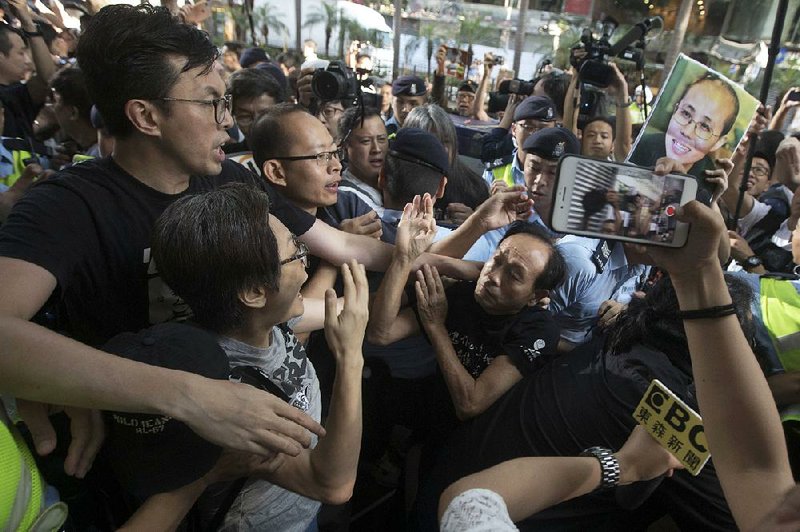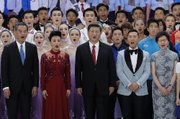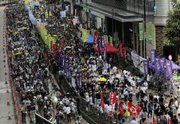HONG KONG -- Chinese President Xi Jinping warned Saturday that any activities in Hong Kong seen as threatening China's sovereignty and stability would be "absolutely impermissible." It was some of his harshest language yet against burgeoning separatist sentiment in the territory.
In a speech marking 20 years since the city became a semiautonomous Chinese region after its hand-over from Britain, Xi pledged Beijing's support for the "one country, two systems" blueprint, under which Hong Kong controls many of its own affairs and retains civil liberties, including free speech.
However, he said Hong Kong had to do more to shore up security and boost patriotic education.
He also appeared to put on notice a new wave of activists pushing for more autonomy or even independence, saying challenges to the power of China's central government and Hong Kong's leaders won't be tolerated.
Any attempt to challenge China's sovereignty, security and government authority or use Hong Kong to "carry out infiltration and sabotage activities against the mainland is an act that crosses the red line, and is absolutely impermissible," Xi said, moments after presiding over the inauguration of Hong Kong's new leader, Carrie Lam.
Hong Kong has been roiled by political turmoil that took tens of thousands of protesters into the streets in 2014 demanding democratic reforms.
Those calls were ignored by Beijing, and Xi indicated that there will be no giving ground in the future.
"Making everything political or deliberately creating differences and provoking confrontations will not resolve the problems," Xi said, adding that Hong Kong "cannot afford to be torn apart by reckless moves or internal rifts."
Jean-Pierre Cabestan, an expert on Chinese politics at Hong Kong Baptist University, said it was clear that Xi's priority is for Lam to revive efforts to adopt long-delayed national security legislation -- which pro-democracy activists fear will be used to suppress dissent -- and patriotic national education in schools, which parents fear is a cover for pro-Communist "brainwashing."
Xi's comments on "infiltration and sabotage" in particular signal that the government will likely try to resurrect security legislation, known as Article 23, against sedition and subversion, said Willy Lam, a political analyst and adjunct professor at the Chinese University of Hong Kong.
They're two polarizing issues that have the potential to mobilize big crowds to take to the streets.
"We are heading towards troubled times," said Cabestan. "I don't think he's going to give up. If he doesn't give up, it means there will be more problems."
While Britain and other Western democracies have expressed concerns about Beijing's actions in Hong Kong, China has increasingly made clear that it brooks no outside criticism or attempts to intervene.
Xi said China had made it "categorically clear" in talks with Britain in the 1980s that "sovereignty is not for negotiation."
"Now that Hong Kong has returned to China, it is all the more important for us to firmly uphold China's sovereignty, security and development interests," he said.
Carrie Lam became Hong Kong's fifth chief executive since 1997 and the first woman to hold the post. The career civil servant and her Cabinet swore to serve China and Hong Kong and to uphold the Basic Law, the territory's mini-constitution.
In a speech that ran a fraction of Xi's 32-minute address, Carrie Lam reviewed the dynamic financial center's achievements and challenges, pledged to support central government initiatives and declared that "the future is bright."
There was other symbolism hinting at the balance of power.
Lam took her oath of office and delivered her address in Mandarin, China's official language, save for a few lines at the end in Hong Kong's Cantonese dialect.
The official transcript of Xi's speech was printed in the mainland's simplified characters instead of Hong Kong's traditional complex characters.
Even the Chinese flag displayed behind Xi as he spoke was noticeably larger than Hong Kong's beside it.
Lam prevailed over a much more popular rival in a selection process condemned by many as "fake democracy," with only 777 votes from a 1,200-seat panel of mostly pro-Beijing elites. Hong Kong has more than 3 million registered voters.
Hong Kong protests
Hours after Xi flew home to Beijing, thousands of pro-democracy supporters gathered for a march through the city's shopping and financial districts to demand greater political openness and to oppose China's creeping influence in their city.
Activists scoffed at Xi's remarks.
The idea that there's a force in Hong Kong sabotaging China or challenging its sovereignty is "ludicrous," said Avery Ng of the League of Social Democrats, a small pro-democracy party. He said Xi used nationalist pride "to alienate any opposition voices that call for democracy and universal suffrage both inside China and in Hong Kong."
Members of Ng's group attempted to march to the speech venue with a mock coffin symbolizing the death of the city's civil liberties, but were met by police and pro-China counterprotesters in a brief standoff.
Ng said he and another activist, Figo Chan, were beaten by the police while they were in custody. The police media office did not answer calls for comment Saturday afternoon.
July 1 is a public holiday in Hong Kong to mark the hand-over to Chinese sovereignty, but it also has become a big day for pro-democracy protests. In 2003, a half-million people took to the streets to protest the government's handling of the deadly SARS outbreak and efforts to enact the Article 23 national security law.
The size of subsequent protests has varied as discontent with the government has ebbed and flowed.
Meanwhile, incidents such as the secret detentions of five Hong Kong booksellers on the mainland have stirred fears that Beijing is undermining the "one country, two systems" blueprint.
Participants in the pro-democracy march largely dismissed Lam as a loyal bureaucrat but said the change in leadership introduced a new measure of uncertainty.
That, combined with Xi's visit, had sharpened the mood for this year's march, said one veteran participant, retiree David Tse. "Things are much more tense. It's much more uncertain," he said.
Organizers estimated the number of participants at 60,000, about half of last year's figure. The pro-democracy movement lost considerable momentum after Beijing turned a cold shoulder to the 2014 protests. Police estimated that 14,500 took part, down about 5,000 from their estimate last year.
University student Sean Law, commenting on Xi's speech, said it showed the president's "ignorance" about Hong Kong.
"He wants to spread China's ideas, but he doesn't understand Hong Kong and has little contact with the people of Hong Kong. His visit is meaningless," Law said.
"Hong Kong originally had freedom of speech, but in the future, under the influence of the Chinese government, it won't be so easy to speak out," Shandi Leung, 25, said as she stood alongside the slow line of protesters walking through the Wan Chai district of Hong Kong island.
Around her, people carried signs for a host of causes: workers' rights, community agriculture, independent media and Falun Gong, the spiritual movement banned in mainland China. They marched in oppressive heat and intermittent downpours, united by calls for a more direct say in their government and concerns that their civil liberties are under threat.
"The Chinese government, they don't want to listen to anyone in Hong Kong or anywhere else," said Lam Ping, a 53-year-old hospital technician who carried a sign calling for the release of Liu Xiaobo, the Chinese Nobel laureate who was recently moved from prison to a hospital for cancer treatment. "They care about the one country, not the two systems."
Information for this article was contributed by Kelvin Chan and Christopher Bodeen of The Associated Press; and by Austin Ramzy of The New York Times.
A Section on 07/02/2017



